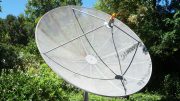The launch of 5G cellular networks in Seoul presented media outlets in the city with a problem: the frequencies used by the phone network overlap with a portion of the C-band satellite spectrum that includes a relay of Korean Central Television on the Thaicom-5 satellite. The phone signals are much stronger than the weak satellite signals and so North Korean TV has become unwatchable — a problem for any news organization reporting on the country.
To get around this, Korea Telecom began relaying North Korean TV on an unaffected satellite frequency in March this year. We wrote about the Koreasat-5 broadcasts when they began earlier year.
At that time it wasn’t clear why North Korean TV had appeared on a South Korean satellite but now it is. The signal is aimed at media organizations and journalists so they can continue to monitor North Korean state TV. However, unlike the C-band signal provided by Korean Central Television, the KT relay is not free to watch.
Domestic media organizations have been given access at no cost through 2019 but foreign media organizations and journalists are being asked to pay.
Shortly after the service launched the price to decrypt the broadcast was quoted at KRW18.6 million (US$15,325) per month, according to message sent to reporters in Seoul. The cost is split between subscribers, so if two organizations subscribe they’ll pay half each, ten organizations will each pay a tenth of the cost and so on.
Since April the price has climbed higher. It now costs KRW54.5 million (US$44,900) per month split between subscribers, according to an email sent to reporters in August.
For the rest of the globe, KCTV remains available free-to-air on Thaicom-5 across Asia, Africa, the Middle East, Australia and much of Europe, and via Intelsat-21 in the Americas and western Europe. You can also watch a free stream via the KCNA Watch service.





